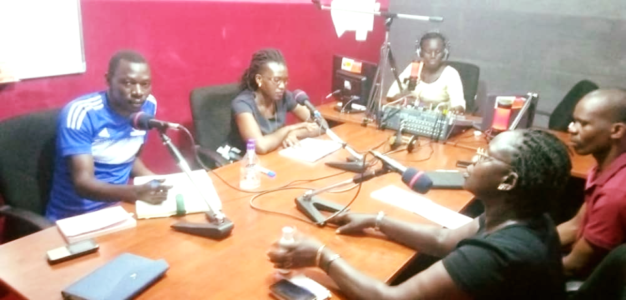On the 15th of June 2020, the representative of Centre for Citizen Conservation Edwin Mumbere hosted a radio show on Spice FM alongside the environment officer of Mubende district Jane Ngongoha, a community women representative Margert Nabajanja and Kyotera youth leader Fred Wamani, who represents the youth at the district on matters of environment and extractives governance in Mubende district.

The radio talk show was part of the ongoing efforts to promote public participation in the planned East Africa Crude Oil Pipeline Environmental and Social Impact Assessment public hearings. It aimed to sensitize the public and communities on the gaps found in the assessment report and on the environmental, social, and economic impacts assessments for the EACOP project while also encouraging the listeners to effectively participate in the public hearings and present their views and concerns to National Environment Management Authority and Petroleum Authority of Uganda.
The East African Crude Oil Pipeline is a transboundary project that will inflict impacts on both Uganda and Tanzania. It intends to cover 1,443km from Hoima; and traverse to the west side of Lake Victoria, cross the rift valley in Tanzania and end at the north Tanga port on the Indian Ocean coast. It covers 296 km, traverses 10 districts in Uganda, 22 sub-counties,4 town councils, 41 parishes, and an estimation of 172 villages. Of the districts include, Kakumiro, Mubende, Sembabule, Kyotera, Kyankwanzi, Kikuube, Rakai, Lwengo, Gomba, and others.
Mr Edwin Mumbere, Environmental Officer Jane Ngongoha, and Fred Wamani spoke not only around how important it is for the community to participate fully in the EACOP ESIA but also the impacts the project would bring to their communities. Twenty-five people (9 male,11 female and 5 youth) called in with questions around how concretely this project will bring economic benefits to these districts and others supporting that the EACOP project could bring short-term development to communities but long-term negative environmental impacts.
The radio talk show revealed a great deal around the need for candid discussions from the district level and not only the national level. It left most of the callers and the participants with a newfound insight that Uganda can do better in terms of energy access by choosing sustainable renewable energy instead of the dying age of fossil fuel use. Callers spoke on how farming is their biggest source of livelihood and destructive projects like the EACOP will negatively affect not only their livelihoods but also their health and way of life.
The show also revealed the importance and needs of increased grassroots organizing and mobilisation to empower communities hosting big fossil fuel projects with ample information on what they are signing onto when they accept such projects into their lands. To build on that and to inspire powerful grassroots organizing, CECIC alongside AFIEGO and other partners will be hosting the AfrikaVuka Caravan on the 6th of August 2020, where they will speak more on why a project like EACOP isn’t needed not only in Uganda and Tanzania but in the rest of Africa.
By Edwin Mumbere
